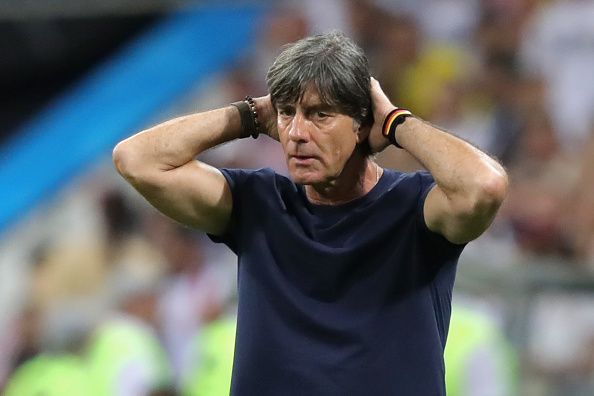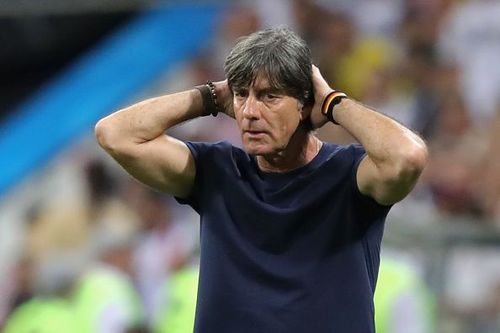
What has happened to the German football team?

The German national team was recently relegated from League A in the inaugural season of UEFA Nations League.
This coupled with their group-stage elimination at the 2018 World Cup has the notoriously consistent Die Mannschaft looking uncharacteristically fragile.
But what has changed? What has caused the four-time World and three-time European champions to become less machine-like and more beatable?
This article will attempt to stir the debate on the potential reasons that led to the dimming star of Joachim Löw's army.
The retirement of Mesut Ozil
This summer, after the debacle of the 2018 German World Cup campaign, five-time German Footballer of the Year and former World Champion Mesut Ozil announced his retirement from the national team.
The mercurial midfielder's quality would be missed in any team, Ozil is the only player in the history of the sport to lead the assists charts in the German, Spanish and English leagues as well as a World Cup and a European Championship.
But is him leaving the squad a valid explanation for the poor results of the national team?
Ozil's last set of performances for the national team did very little to convince the supporters
At the Russian World Cup this year, Ozil played the full 90 minutes in two of Germany's games, the team lost both, to Mexico and to South Korea. The one game Ozil failed to feature was the German's only win and only points of the entire tournament.
This pattern seems to go even further than the Russian showpiece. In the eight games leading up to the 2018 World Cup, the Germans won just three games. In all three victories, Ozil did not participate. In 2018, Germany was winless in every game Ozil featured.
Germany's Ozil-less Confederations Cup triumph could also be pointed at when giving value to the national team's potential without the ex-Real Madrid No.10.
There is no doubting Mesut Ozil's technical astuteness and his remarkable eye for a pass but the decline of the German national team seemed to be taking place well before their Nations League involvement sans Ozil.
Neuer v Ter Stegen
Manuel Neuer will go down as a German legend. The 32-year old Bayern Munich No.1 is one the few goalkeepers in history to be nominated for the prestigious Ballon d'Or award.
A player often credited for revolutionizing the goalkeeper position, Neuer has been selected to the FIFA FIFPro World XI team a sensational four times, more times than any other German player in history.
However, the goalkeeper has struggled with injury in recent seasons causing him to miss a massive chunk of football in 2017 and 2018. Neuer played just three Bundesliga games in the season prior to the 2018 World Cup.
Despite this, Germany stuck by their man and Neuer started every one of Germany's World Cup and Nation's League games.
His club Bayern Munich has also suffered from allowing the big German to find his form, the Bundesliga champions find themselves a disappointing 5th place in the log despite welcoming back Neuer in goal.
Neuer's apparent untouchable status can be a bit bewildering considering Germany has one of the world's premier goalkeepers, Marc-Andre Ter Stegen, as a backup.
Barcelona's starting goaltender has all the tools necessary to be the new protector of the German goal. He is an excellent shot stopper, great with his feet and consistently performs at a high level for his club.
Arguably, Ter Stegen has already shown his country what he can do if given the responsibility of his national team. Germany's victorious 2017 Confederations Cup run was capped off by a Man of the Match performance by Ter Stegen in the final.
Ter Stegen was selected as Germany's No.1 for that tournament and convinced the world that he was Neuer's replacement in waiting.
With Neuer's injury, Ter Stegen was then selected as the first-choice goalkeeper for Germany's World Cup qualifying campaign.
With Ter Stegen in goal, the Germans won every single World Cup qualifying game, conceding just twice. Amazingly, Germany has not lost with Ter Stegen starting in goal since June 2013.
Who is the Great German Forward?
All successful German teams have a few constants, one of the ingredients of German success is a great goal scorer.
Germany boasts five forwards with double-figures of World Cup goals to put that into perspective Brazil only have two, the great Pele and Ronaldo.
This current German team has struggled to find a player capable of finishing chances as consistently as their predecessors.
It seems a real issue, at the World Cup, Germany had 75 shots, 16 more than any other team in the entire group stage, and somehow only scored two goals.
The UEFA Nation's League was much of the same, prior to being relegated the Germans scored just one goal, a Toni Kroos' penalty.
The men trusted to be at the end of these many chances are RB Leipzig's Timo Werner and Raumdeuter, Thomas Müller.
Ignoring, Werner's promise and Müller's historic career, it is questionable if these attackers are currently the best in Germany.
Last Bundesliga season, the season leading into the World Cup, Germans Nils Petersen, Niclas Füllkrug, Mark Uth and Kevin Volland were all omitted from Germany's World Cup squad and all scored more goals than both Werner and Müller.
Müller, in particular, has struggled in front of goal scoring just five Bundesliga goals in the 2016-2017 season and eight goals in the 2017-2018 season.
Tension and disorganization within the DFB
For the last few years, Germany has been rightly praised for engineering a footballing machine. Often described as a machine because of the German's on and off the field organizational precision, timing and overall footballing framework.
While on the field things are obviously not going as accustomed, off the field isn't either. As mentioned above the German national team selection process is questionable, an accusation rarely aimed at German teams.
In addition, the German Federation was accused of racism towards Ozil, İlkay Gündoğan and Leroy Sane.
In Ozil's retirement statement the player revealed that he did not feel supported by the Federation. The controversy surrounding Ozil's retirement led to rumours of a divided German camp, again something previously unheard of.
German football transfers have also been orchestrated in a way where it is not a circus akin to other European Leagues, where the national team is strong because German transfers are almost always with a developmental purpose.
But recently things are changing. Last season, once one of Germany most promising strikers, Pierre-Michel Lasogga, left the Bundesliga for Leeds United in the English Championship.
This summer, German World Cup winners Erik Durm and André Schürrle signed for Huddersfield Town and Fulham respectively.
Even the young Felix Passlack, a national U-17 captain, has left Bundesliga table-toppers, Dortmund for a season with Norwich City. These type transfers are unusually odd for German players and may be hurting the overall quality of the player pool.
Lack of modern wingbacks
Football is always evolving, and the attacking quality of wingbacks is becoming more and more important to the goals capacity of a top team. But wait, does Germany not have Joshua Kimmich? Surely he is one of the best wingbacks in world football.
Anyone who follows German football closely knows that Joshua Kimmich rose to prominence as an all-action central midfielder. Germany is determined not to have him stuck as a right back and him not being able to develop to his full potential.
Because of this Kimmich has played the full 90 minutes in all of Germany's Nation League games in the centre of midfield and not right back.
When Germany waved good-bye to Philipp Lahm they also waved farewell to one of the best-attacking wingbacks,(left and right) the game has ever seen.
The left-back position is of alarming concern as the options are far from world class. Hertha Berlin's Marvin Plattenhardt started the position at the World Cup and since lost his place.
Jonas Hector has started games at left back in both the World Cup and the Nation's League but plays his football in the German second division. Lately, Hoffenheim's Nico Schulz has been giving the role but he isn't a natural left back.
On the right side, there is also a problem because of the persistence with Kimmich in the midfield. Thilo Kehrer, Matthias Ginter and Antonio Rüdiger have all tried their hands or rather feet at the position but all of three of these players are central defenders at their clubs.
Poor German Youth Teams
Is this even a thing? Traditionally if a team is German it is very likely it will be at a high standard, independent of age. But after some shocking youth level results, many are challenging the direction of the German football program.
The U-19s failed for the first time in five editions to qualify for the final stages of the U-19 European Championships.
A 5-2 drubbing to the hands of traditional European minnows Norway, although powered by Nordic phenom Erling Håland, saw the undoing of the German U19 team.
At the U-17 level, the Germans also crumbled. Despite qualifying for the final stages of the U-17 version of European Championship the Germans were destroyed 3-0 by Dutch in the opening game and were embarrassed 5-1 by the Spanish in their final group game. These types results are becoming too common for German football.
In the End
The resilience of the German football set-up is well documented. The program has the incredible ability to reassess things and create a dangerous team again.
Case in point, after back to back group stage exits from Euro 2000 and 2004, Germany refocused and qualified for seven straight semifinals.
Joachim Löw has steadied the ship for the last 12 years and maybe his loyalty to the players who brought him success can explain some dubious team selections. A new pair of eyes can both offer a clean slate and provide motivation to players who think they will never get a look in.
In terms of the problem positions of centre-forward and wingback, Timo Werner is just 22-years old and can only get better, behind him Hamburg's Jann-Fiete Arp is an 18-year old, a classic No. 9, who has the whole of Europe circling, already rejecting a move to Spanish giants Real Madrid.
At the wing back positions, players like Toljan, Klostermann, Henrichs and Weiser should realise their qualities can be utilized by Germany and step up their individual performances at club level.
Finally, how can Germany replace such a magical player in Mesut Ozil? While Ozil's unique style makes a like for like replacement almost impossible, the German midfield conveyer belt is neverending and is still probably the strongest position on the team.
Bayern Leverkusen's Kai Havertz is the expected and worthy heir to the German midfield creative throne.